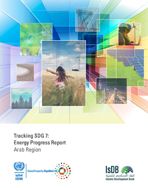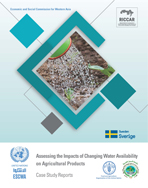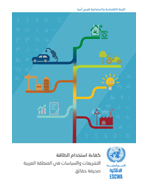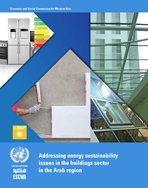Arab Centre for Climate Change Policies
Mandates
Arab Centre for Climate Change Policies (ACCCP) was established pursuant to resolution 329 (XXX) adopted at ESCWA’s 30th session on 28 June 2018. 
This resolution was based on the culmination of work conducted through technical assistance and capacity development services that ESCWA had been delivering to Arab States in the areas of climate change assessment, adaptation, mitigation and negotiations for over a decade in response to requests for assistance from member States, including those articulated in resolutions adopted by ministerial councils that convene under the auspices of the League of Arab States.
The resolution requests the Centre to support member States through five areas of work focused on the following:Providing technical assistance and advisory services to Arab States;
Building the capacity of Arab States and regional stakeholders to strengthen institutional frameworks and develop programmes and policies;
Supporting regional platforms to harmonize positions and build regional consensus;
Promoting comprehensive responses to climate-related challenges affecting water, energy and food security;
Providing access to knowledge products and to regional data and information using the Regional Knowledge Hub. The resolution also requests ESCWA to:
- Expand capacity-building efforts at various technical levels by holding workshops on climate modelling, means and financial instruments to support climate change negotiations, assessment processes, access to financing and technology transfer;
- Provide regular updates on climate change developments to negotiators and other actors in the field of adaptation and mitigation, while emphasizing the principle of coordination in implementation with concerned organizations;
- Ensure that the multidimensional aspects of climate change are taken into account in work on water, energy, food security and sustainable development; and
- Support the Arab Climate Outlook Forum (ArabCOF) and to strengthen partnerships with concerned organizations.
In this way, the ACCCP’s ultimate purpose is to strengthen the capacity of Arab States to better understand and address climate change implications for sustainable development. The activities pursued under the Centre also consolidate the work of different clusters at ESCWA, which have been looking at climate change as a megatrend that creates multiplier effects which exacerbate conflict or threaten peace and security in the region.
Partnerships and Technical Expertise
The Centre builds upon a number of partnerships that have allowed for the provision of technical assistance and capacity development support to member States, and for the generation of new knowledge on climate change issues facing the region.
This includes a strong network of partners and collaborators within the United Nations System, with the League of Arab States and its associated organs, and with international development agencies committed to supporting climate action. Strengthening existing partnerships and forging new ones also supports the coordination and complementarity of regional work on climate change through the Centre.
The Centre draws on a series of programmes and activities that build on accumulated knowledge through scientific assessments developed over a wide range of projects since the adoption of the first Arab Ministerial Declaration on Climate Change in December 2007 by the Council of Arab Ministers Responsible for the Environment. It has thus established leading technical knowledge expertise in the field and provides access to knowledge products, regional data and geospatial technical tools for informing climate change assessment, adaptation, mitigation, disaster risk reduction, financing and technology transfer in key sectors in the Arab region. These can be accessed through a dedicated Regional Knowledge Hub, comprised of a specialized website and a data portal.
Governance
The Centre is hosted at ESCWA in the Climate Change and Natural Resources Sustainability Cluster, which has been leading the Centre’s work since June 2018. Its governance structure consists of a Technical Advisory Group (TAG) and a Partnerships Advisory Group (PAG), supported by a secretariat based at ESCWA. The Centre’s work programme combines resources available through extrabudgetary projects, RPTC and the ESCWA regular programme of work to ensure the management, coordination and implementation of its activities.
The TAG provides scientific and technical input in the planning, implementation and review of the Centre’s programmes of work and activities. The TAG is composed of multidisciplinary members who are leaders in the field of climate change research and policy making, and its related areas, and are appointed on the basis of their outstanding technical expertise and relevant experience in those fields.
The PAG comprises a network of partners ranging from the League of Arab States and its specialized agencies, to United Nations sister agencies, international climate research centres, and other relevant institutions. Through this PAG, the Centre fosters complementarities across the work of partner institutions, which conduct activities in various climate change areas. In doing so, ESCWA will seek to ensure that collective efforts are pursued in an Arab context and that dialogue and exchange are fostered among Arab States.
Areas of work
The list of themes below are among the climate change related issues being examined through an integrated lens by the Centre, complemented by thorough supporting processes such as capacity building activities and tools. It is expected that the integration of climate change policy analysis across disciplines in the region will continue as climate action becomes incorporated in emerging thinking about the humanitarian-development nexus, peace, security and conflict analysis, the urban-rural divide and disaster risk reduction.
Thematic areas of work
 |
In response to the crucial need to better understand the impact of climate change on water resources in the Arab region, ESCWA’s work coordinating the implementation of RICCAR has resulted in the first Arab Climate Change Assessment Report, which provides a scientific basis for informing climate change policy and priority setting in the Arab region through a region-specific geospatial integrated assessment methodology. All findings and datasets are made available on a dedicated Regional Knowledge Hub, which provide easy access to all outputs stemming from the assessment and focused on Arab issues and priorities. Climate assessments are being further pursued under the Centre with additional sub-regional analyses. |
 |
Evidence from RICCAR findings shows that the region is exposed to face increases in the frequency and intensity of extreme weather events by the end of the century. This science-based information, in addition to existing disaster loss databases are a starting point to projects and activities being conducted under the Centre in order to inform measures and actions on adaptation and DRR at the regional/national levels as well as at the sectoral level. These activities seek to support Arab stakeholders in lowering risks posed by the climatic change impacts in terms of weather-related hazards and disasters and increase resilience within this context. |
 |
A series of projects are being conducted under the Centre in the area of climate mitigation, of which activities related to Promoting Renewable Energy and Energy Efficiency Investments for climate change mitigation and sustainable development, up-scaling energy efficiency in the residential and services sectors in the Arab region, and others. Resources are also being allocated to support regional work on monitoring and reporting on SDG7 as well as geographic information system tools for transportation networks, which could potentially support further work on mitigation opportunities presented by improved energy efficiency in the transport and logistics sector. |
 |
ESCWA has been providing technical support to Arab negotiators on climate change through regional training workshops on capacity development for climate change negotiations that ESCWA organizes with the League of Arab States, in partnership with UNEP and UNESCO. The Arab Group of climate change negotiators participates in these biannual workshops, which are targeted for senior Arab climate change negotiators and incorporate discussion issues that tackle items for negotiation under the UNFCCC and Paris Agreement, covering a wide range of subjects such as finance, technology and scientific knowledge to inform understanding of climate change impacts and response measures. |
 |
This thematic area comprises projects and activities conducted within the framework of the Centre to enhance the understanding of climate finance and its related processes for adequate support in the Arab region, as well as its role in supporting mitigation and adaptation actions. |
 |
Support for technical assistance is being provided on geospatial information tools and applications that can assist Arab States and stakeholders to better understand the implication of climate change across subnational and national boundaries, based on institution or country-level requests. Access to additional tools such as the Regional Knowledge Hub’s Data Portal to promote relevant data use and exchange is also being provided for effective climate change analysis and ultimately decision support. |
 |
The Centre consolidates the work on a range of environmental and socio-economic disciplines that involve the multidimensional aspects of climate change, such as integrating projects and issues related to water, energy, food security and sustainable development, as well as work to support the Arab Climate Outlook Forum (ArabCOF). |
Stakeholder supporting processes and materials
 |
The Centre provides a platform to convene and contribute to events involving a wide range of stakeholders from governments, international organizations, research institutions, civil society, think tanks and the private sector to promote knowledge and action towards appropriate decision making at concerning climate change and its impacts the Arab regional level. |
|
|
Capacity-building and outreach efforts on climate change are being conducted for Arab States and regional stakeholders at various technical levels through holding regional and national workshops on models, means and financial instruments to support climate change negotiations, assessment processes, and access to financing and technology transfer, and providing regular updates on climate change developments to negotiators and other actors in the field of climate change adaptation and mitigation, while emphasizing the principle of coordination in implementation with the concerned organizations. |
|
|
Publications generated based on work being collectively pursued under the Centre include assessments and training materials that draw upon RICCAR climate datasets and findings, as well as technical material and country reports on specific climate-related issues or aspects in the Arab region such as climate adaptation, food security, and sustainable energy resources. Other reports pertaining to national strategies also heavily draw upon datasets generated by the Centre. |











